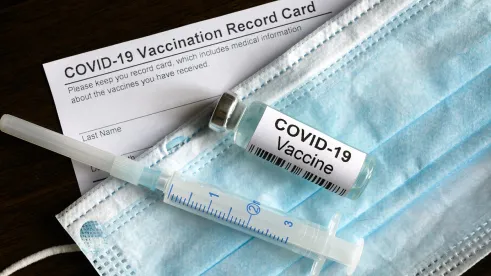Earlier today, the Equal Employment Opportunity Commission (EEOC) issued its long-awaited guidance concerning the permissibility of employer vaccination incentive programs and, at the same time, provided further guidance related to other vaccination questions.
EEOC Gives Okay to Incentive Programs - With a Word of Caution for Employer-Provided Vaccinations
In the updated guidance, the EEOC advised that neither the Americans with Disabilities Act (ADA) nor the Genetic Information Nondiscrimination Act (GINA), prevent employers from adopting incentive programs for employees who voluntarily receive the COVID-19 vaccine or requiring participating employees to provide proof of vaccination to be eligible for the incentive.
At the same time, the agency concluded that employers need to avoid offering “very large incentives” in the case of vaccinations administered directly by the employer or its agent - as opposed to the employee receiving a vaccine independently from a third-party, such as a pharmacy or public health authority not under contract with the employer.
The EEOC’s concern with large incentives in the case of vaccines administered by the employer or its agent is that the vaccination process necessarily involves certain pre-vaccination medical disclosures and, therefore, a “very large incentive” may effectively coerce an employee to participate in the process and disclose medical information to the employer in violation of the ADA.
Unfortunately, the EEOC gives no indication as to what “very large” means in this context. Employers concerned their incentive will be deemed “very large,” may want to avoid administering the vaccine to employees either directly or indirectly through an entity under contract with the employer. Given the availability of the vaccine, employees can easily receive the vaccine at a pharmacy or clinic, or through a public health authority.
Individual Employee Vaccination Information is “Confidential Medical Information” Under the ADA
In an earlier version of its guidance, the EEOC concluded that requesting or requiring documentation confirming that an employee, in fact, has been vaccinated, did not constitute a “disability-related inquiry” under the ADA.
That interpretation by the EEOC made many employers wonder whether the vaccination records obtained constituted a confidential “medical record” under the ADA. In its new guidance, the EEOC eliminates any uncertainty with regard to that issue and directs employers to treat vaccination records and information pertaining to individual employees as “confidential medical information” under the ADA. As a result, information related to individual employee vaccination status will need to be kept securely on separate forms and in separate medical files and with limited access to those records. The EEOC does not answer, however, the important practical question regarding to what extent an employee’s vaccination status can be shared with supervisory personnel to assure that only vaccinated employees are following an employer’s more relaxed mask and social distancing policy, consistent with the CDC’s most recent guidance. What is clear is that an employer should strictly control vaccination information and only share it on a truly need-to-know basis.
With Mandatory Vaccination Programs, Employers Need to Be Properly Prepared To Identify and Address Requests for Accommodation Based on a Disability, Pregnancy, or a Religious Belief or Practice
While in the December version of its pandemic guidance the EEOC concluded that mandatory vaccination programs were generally not inconsistent with the ADA or Title VII, the agency had little to say about how employers should address requests for accommodation from employees seeking to be excused from a mandatory vaccination requirement because of a medical or religious concern. In its updated guidance, the EEOC provides more specific information concerning accommodation requests.
In the guidance, the EEOC also considers the fact that some employees may request exemption from a vaccination requirement based on pregnancy. The agency emphasizes that if an employee makes such a request based upon pregnancy, the employee must be allowed any exemption or other modification that is provided to other employees who are similar in their ability or inability to work. Additionally, it is important to note that a pregnancy-related condition can conceivably constitute a disability under the ADA and require ADA accommodation. In sum, employers need to carefully consider any request for exemption or other accommodation based on pregnancy and assure that they fully comply with both Title VII's pregnancy discrimination protections and the ADA.
Also, while not describing this step as mandatory, the EEOC does opine that “[a]s a best practice, an employer introducing a COVID-19 vaccination policy and requiring documentation or other confirmation of vaccination should notify all employees that the employer will consider requests for reasonable accommodation based on disability or an individualized basis.” While this particular statement does not expressly address accommodation of concerns based upon religion or pregnancy, presumably an employer would alert employees of its willingness to consider accommodations based on a disability, a religious belief or practice, or pregnancy.
The EEOC further elaborated on accommodation obligations in other respects and effectively imposed further duties on employers. For instance, the EEOC now directs in its guidance that “[m]anagers and supervisors responsible for communicating with employees about compliance with the employer’s vaccination requirement should know how to recognize an accommodation request for an employee with a disability and know to whom to refer that request for full consideration.”
The Future
In light of this new guidance, employers who were initially reluctant to provide incentives may reconsider that issue. A COVID-19 vaccination incentive program may be one of a number of best practices for employers to ensure a safe workplace for employees.
Moreover, any employer collecting vaccination information, as part of either a mandatory or voluntary program, must reassess whether they are handling vaccination information consistent with confidentiality obligations under the ADA.
Finally, for employers considering a mandatory vaccination program, the updated guidance provides additional key considerations related to an accommodation program for employees who have medical or religious concerns with receiving the vaccine.





 />i
/>i

